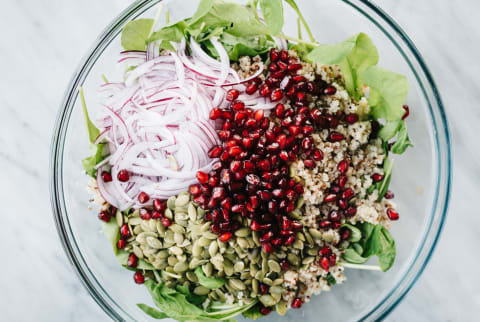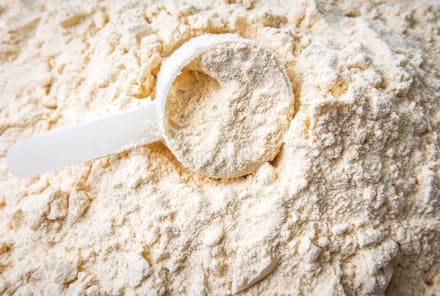Advertisement
The Renal Diet: Here's How To Eat For Your Kidneys


Many of you have probably heard the saying "All disease begins in the gut." But how true is that, really? You might be surprised to learn that the gut and kidneys are more connected than you think.
The gut-kidney connection you should know about.
The gut microbiome, which is the ecosystem of trillions of bacteria that live within our gastrointestinal tract, plays a pivotal role in chronic disease. When we eat foods higher in choline (like eggs, beef, and dairy), the bacteria in the gut metabolize this and turn it into something called TMAO, or trimethylamine N-oxide1. TMAO has been associated with things like heart disease and with chronic kidney disease. Knowing this supports the idea that food you eat changes the microbiome and can contribute to the development of chronic disease.
So how does this relate to the kidneys? A recent article reviewed the potential connection between gluten intake and IgA nephropathy (a disease that causes damage to the tiny filters inside the kidneys) and suggested there exists a strong gut-renal connection2. This is an interesting observation about how gluten ingestion could potentially be a driver of an immune-mediated disease that affects the kidneys. Even more interesting is that there's currently a trial, led by pioneer Alessio Fasano, M.D. (one of the world's leading experts on gluten), looking to see if a gluten-free and dairy-free diet can contribute to an improvement in clinical parameters in children with nephrotic syndrome3, a kidney condition where there is spillage of protein in the urine. The study is designed to evaluate what role diet could have in the function of the kidneys, the immune system, and the gut microbiome.
This is what the term "renal diet" really means.
When we talk about a "renal diet," what we really mean is a diet that is healthy for your kidneys and your gut microbiome. We should be focusing on dietary interventions that are going to help us cultivate a healthy gut microbiome and also protect our kidneys at the same time. The best way to eat for your microbiome is to focus on a whole foods plant-based diet full of fiber and probiotic-rich foods. Beyond that, it's hard to give an exact dietary protocol for the general public because each person has a unique gut microbiome (in fact, we are only about 10 to 20 percent similar in our gut microbiome composition). Therefore, the best thing to do is to get your gut microbiome tested and follow those recommendations. Luckily, with the amazing advances we have made in science and technology4, we are now able to help you figure out what you should eat for your unique microbiome.
How to prevent kidney stones thought dietary changes.
One of the most common kidney conditions that you might also know about is kidney stones, also known as bladder stones. A recent review outlined that phytochemicals such as catechin, epicatechin, epigallocatechin-3-gallate, diosmin, rutin, quercetin, hyperoside, and curcumin were good sources of antioxidants and found to be good choices in preventing the development of bladder stones. These plant products have properties that include diuretic, antispasmodic, and antioxidant capabilities. Plus, they can inhibit the crystallization and clumping of crystals5. Another recent article suggested that people with recurrent kidney stones should keep their dietary calcium intake6 in normal ranges so that the potential for increased urinary oxalate excretion can be avoided. Some of the existing literature on dietary approaches to preventing kidney disease include suggestions such as increasing fluids, limiting sodium, consuming citrates, keeping protein consumption moderate, and increasing fruits and vegetables but limiting spinach (in those with hyperoxaluria), and including lemon, lime, melon, and oranges in your diet if you have hypocitraturia7.
Renal diet foods.
So, as you can see, diet really can make a big impact on how the kidneys work and how kidney conditions develop. Particularly with kidney stones, it is important to know what kind of stones you are producing so you can customize your diet a bit more specifically. Just as in any diet, if you provide your body with the ingredients it needs to keep things controlled, the body will do its very best under the circumstances to keep you healthy. Remember that the kidneys are one of the most important organs because they are a key detoxifier. We eliminate waste through the kidneys and rely on them to keep our bodies clean. This is one reason you might find that the data supporting certain foods for preventing kidney disease are common foods recommended to prevent a wide range of diseases. A recent study showed that a healthy diet in kidney8 disease is made up of fruits, vegetables, fish, legumes, whole grains, and fibers; they also suggested that red meat, sodium, and refined sugar intake should be cut down. Sound familiar? That's because this diet is also suggested for preventing illnesses like heart disease, cancer, and diabetes.
If you're interested in getting some more details on food preparation and kidney-friendly recipes, I've collected a few websites you might find helpful:
One last point I would like to make is to never let your doctor or health care provider tell you that diet is not important when it comes to kidney health. Diet is important. It's one of the keys to health. Not only is diet important for your heart health and your brain health, but diet is important for your gut health and your microbiome. In turn, we have the opportunity to protect our kidneys and give them the nutrients and power they need to help us function as best as we can.
8 Sources
- https://www.ncbi.nlm.nih.gov/pubmed/26616538
- https://www.ncbi.nlm.nih.gov/pubmed/30177022
- https://www.ncbi.nlm.nih.gov/pmc/articles/PMC6093178/
- https://www.ncbi.nlm.nih.gov/pmc/articles/PMC4446416/
- https://www.ncbi.nlm.nih.gov/pubmed/29518971
- https://www.ncbi.nlm.nih.gov/pubmed/29202723
- https://www.ncbi.nlm.nih.gov/pmc/articles/PMC4265710/
- https://www.ncbi.nlm.nih.gov/pubmed/28505087
Watch Next
Enjoy some of our favorite clips from classes
Enjoy some of our favorite clips from classes
What Is Meditation?
Mindfulness/Spirituality | Light Watkins
Box Breathing
Mindfulness/Spirituality | Gwen Dittmar
What Breathwork Can Address
Mindfulness/Spirituality | Gwen Dittmar
The 8 Limbs of Yoga - What is Asana?
Yoga | Caley Alyssa
Two Standing Postures to Open Up Tight Hips
Yoga | Caley Alyssa
How Plants Can Optimize Athletic Performance
Nutrition | Rich Roll
What to Eat Before a Workout
Nutrition | Rich Roll
How Ayurveda Helps Us Navigate Modern Life
Nutrition | Sahara Rose
Messages About Love & Relationships
Love & Relationships | Esther Perel
Love Languages
Love & Relationships | Esther Perel

















